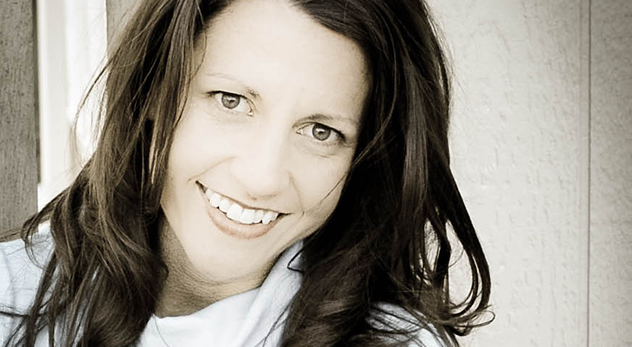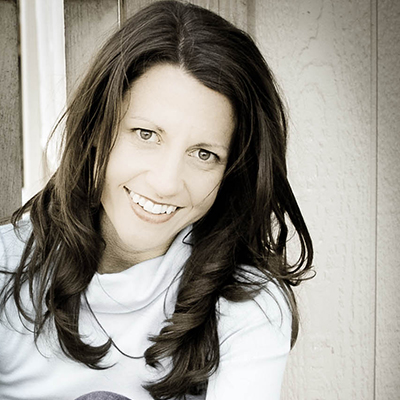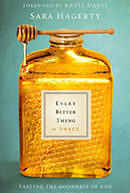
Hagerty shares valuable lessons she learned from years of wrestling with marital difficulties, financial stresses, and a brutal battle with infertility. – Image courtesy of Sarah Hagerty
Sara Hagerty has waded wehrough the murky waters of marital trouble, infertility, financial struggles and coming to face-to-face with a global orphan crisis that shook her theology to its core. Each of these life crises ushered her in to deeper intimacy with God–a journey she catalogues in her book “Every Bitter Thing is Sweet: Tasting the Goodness of God in All Things”–but the end results didn’t make them any less painful in the moment. Here we discuss how she dealt with the depth of her darkest days and what she says are the best (and worst) ways to respond to grieving friends.
RNS: Your book seems to be written for a predominately female audience, but I think there’s something in it for everyone who wrestle with burnout, infertility, financial struggles, marital challenges? Right?
SH: Though it’s written in my voice and through the lens of my story, the opportunity to find God in the pain of unexpected circumstances and the ache of the mundane is universal. God truly is near to the brokenhearted – a sentiment we toss around but awkwardly fumble to live – and it’s this nearness that changes a person.
RNS: You and your husband, Nate, experienced the struggle of infertility. Talk about how you both experienced that uniquely.
SH: Nate often experienced pain because I was in pain. Not that he didn’t also ache for the baby that we didn’t have, but what throbbed heavier for him was watching me wait. He couldn’t access the part of me that felt like I’d missed a “rite of passage” because my body was barren. He hurt for me.
So Nate lived out the reality of his limitations within a circumstance that he couldn’t change for me. This delay shaped both of us, as we talked to God and studied His Word from within it.
I had to wrestle to discover that God was good—to me—in my barrenness. Nate had to wrestle through seeing God as a tender and near Father—not a distant leader—when he cried out to God on behalf of His wife. And we both had to wait.
RNS: In the midst of this, your husband’s business was struggling and you were facing your own losses. Was it difficult to support one another on your darkest days?
SH: [tweetable]One of the hardest parts of walking through difficulty is what comes up and out of you.[/tweetable] Nate and I saw the worst sides of each other. When everything hurt, our immature, primal instinct was sometimes to hurt each other.
But that’s when we really fell in love—in the dark.
One of the first times I experienced the notion that God didn’t just like me, but that God was wild in love over was a night that I felt God give me His eyes for Nate as he crumbled in front of me after a conflict. As I’m watching my husband through this holy-other perspective, deep love bubbled up within me. I had this thought: “Is this really how God sees a person?”
RNS: Often others don’t know how to support those experiencing great loss. What were the most unhelpful responses you received?
SH: Early on, I was more naïve to how quickly we all reach for a “solution” to others’ problems. I’d tell people my story and then leave myself wide open for unfettered commentary. I almost invited it.
The sound bytes that were harder to forgive—the ones that left a mark—were from well-intentioned friends who thought that what I needed was an answer and not God Himself. I was on a remote footpath with God and these friends communicated to me as if I was lost and all I needed was the map.
And there were those sympathetic ones, wanting me to give up hope for my womb to open for my own sake. But something inside told me to hang onto hope—and Scripture always led me there. I chose to stay in that awkward nexus of hope and the “not yet”.
RNS: What were the best responses?
SH: A friend showed up at my doorstep on possibly the worst Saturday of our multi-year struggle and her first words through the door were: “I’ve come to bring you courage.” She talked to me about God and who God was—for me, right then. She quoted scripture and reminded me of what I didn’t see—the face of this man, Jesus.
Another encouraged me over a cup of tea to start adoring God, through God’s Word. To start speaking God’s Word back to Him. It was so practical that I didn’t expect it to be life changing. But it was.
These friends didn’t try to help me climb out of my circumstances or dismiss them, but pushed me to sit on God’s lap and see a different side of God. They proved to be the best companions in my mess.
RNS: You’ve found the sweetness life’s disappointments, and they driven you to intimacy with God. The risk, I think, is that we want to jump there too quickly. What about those seasons when you didn’t feel God’s nearness?
SH: You’ve hit it with this question. Intimacy—as I grew to understand it—wasn’t a pithy platitude about God or colorful scripture verses plastered on my wall. It was a deep, almost guttural, cry from inside of me to which I finally gave permission. Intimacy was an underground conversation in which I wept at God’s feet.
Talking to God became less about whether I could physically “feel” God near and more about posturing myself as one who was needy. I’d not done that—perhaps ever—when life worked for me.
I realized, in my dark days, that my biggest barrier to intimacy was me. Even if I couldn’t feel God, I’d rarely let myself bleed before Him. That kind of bleeding – alongside the quite literal clinging to God’s Word and what it said about Him – cracked me open to God.







